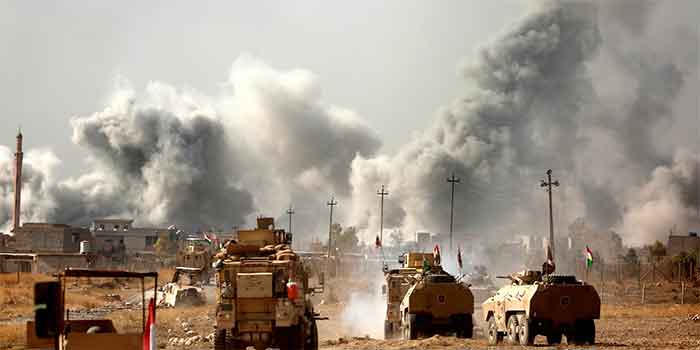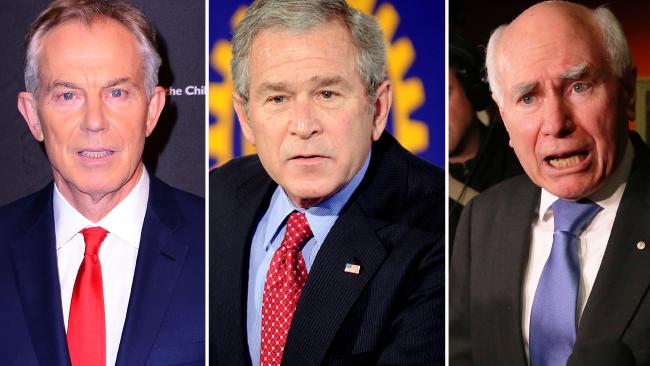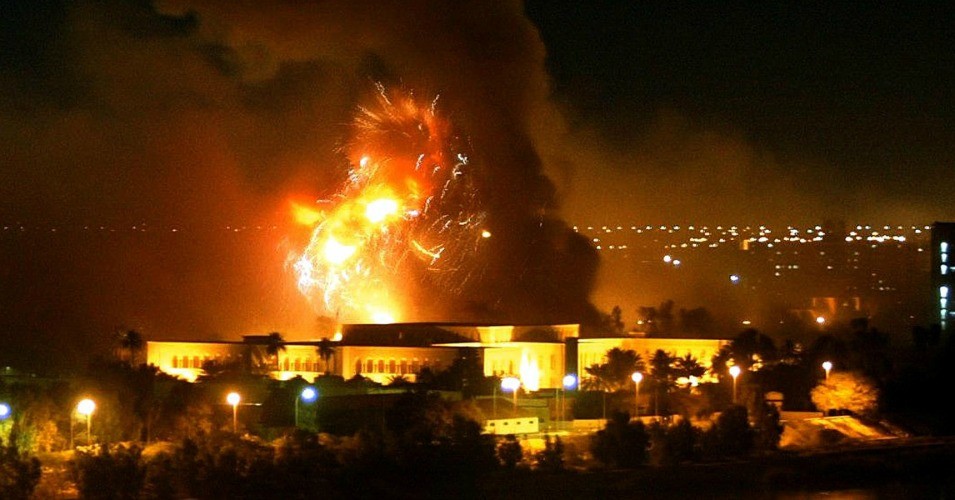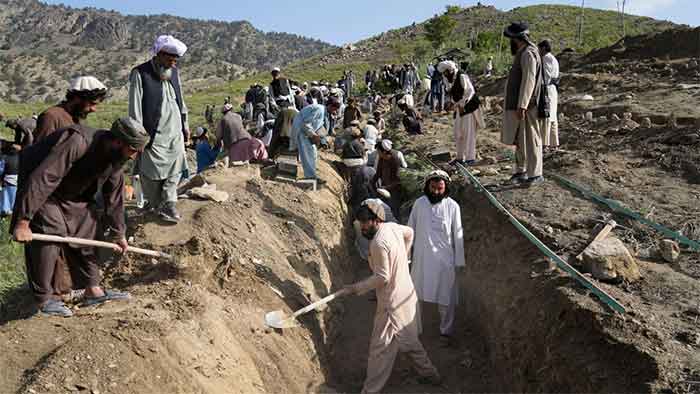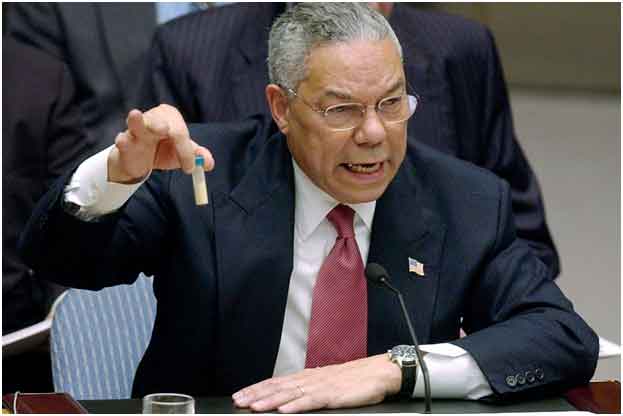
Invasion of Iraq and Crisis of American capitalism
The War of Iraq by the United States is an event that will be inscribed in black letters forever. Hundreds of millions of people in every part of the world revolted to the bloodbath of a merciless military power shattering a small and defenceless country. The invasion of Iraq was an imperialist war in the classic sense of the term: a barbaric act of aggression that manifested the interests of the most reactionary and predatory sections of the financial and corporate oligarchy in the United States. Its immediate purpose was s the establishment of monopoly over Iraq’s vast oil resources and converting that long-oppressed country to an American colonial protectorate.
Not since the 1930s—when the fascist regimes of Hitler and Mussolini were at the height of their power and madness—was the world faced with such International level of barbarism. . The goal of the American military to harbour an onslaught of thousands of missiles and bombs on the city of Baghdad is part of a conscious strategy to break the backs the Iraqi people. What the Pentagon referred to as the strategy of “Shock and Awe” drew its inspiration from the methods deployed by the Nazi Wehrmacht at the opening of World War II.
The purpose of this war was to eliminate Iraq’s so-called “weapons of mass destruction. Other major allegations, relating to the use of aluminium tubes for nuclear purposes and the existence of mobile laboratories producing chemical-biological weapons, were also investigated to be fabricated..
The second major justification for war against Iraq—that the Ba’athist regime of Saddam Hussein collaborated with Al Qaeda terrorists—is another false invention upon which the Bush administration depended upon , as the findings of the United Nations’ inspection team dispelled claims of weapons of mass destruction.
The regime of Saddam Hussein is itself a creature of the nefarious efforts of the United States, throughout the 1950s, 1960s and even into the 1970s, to eradicate the socialist workers’ movement that once represented a significant political force in the Middle East. The coup d’etat of February 8, 1963 that overthrew the left nationalist Qasim regime and brought the Ba’athists to power for the first time was organized with the support of the CIA.
It was in such bloody operations that Saddam Hussein first sparkled as a major figure in the Ba’ath movement. Later in his career the United States supported his bloody purge of Iraqi Communists in 1979 that played a crucial role in his consolidation of power. Hussein’s decision to go to war against Iran in 1980 was encouraged by the United States, which provided him with material and logistical support for the next eight years. Much of the stockpile of biological agents that Hussein built up in the 1980s was provided by an American company, the American Type Culture Collection of Manassas, Virginia. This was done with the explicit approval of the Reagan-Bush administration. “ATCC could never have shipped these samples to Iraq without the Department of Commerce’s approval for all requests,” said Nancy J. Wysocki, vice president for human resources and public relations at the American Type Culture Collection, a nonprofit organization that is one of the world’s leading biological supply houses. “They were sent for legitimate research purposes.”[iii]
The attempt to champion democratic ideals as an excuse for attacking Iraq ignores one l democratic principle: that of national self-determination. The invasion and conquest of the country, and establishment of a military protectorate under would-be Generalissimo Tommy Franks, represent a gross te violation of Iraq’s national sovereignty.
.The vociferous glorification of war as a legitimate weapon of global imperialist realpolitik represents a political and moral regression. A significant body of international law was contrived on the basis of the bloodshed of the first half of the twentieth century. The carnage of World War I between 1914 and 1918, which killed tens of millions of people, led to a furious controversy over responsibility for the outbreak of hostilities—the question of “war guilt.” The issue of “war guilt” took an even more sinister form at the end of World War II. The undoubted responsibility of the Third Reich for the outbreak of war in 1939 led to the decision of the Allied powers, of which the United States was the most powerful representative, to place the former leaders of the German state on trial.
. The principal objective of the war was to capture control of Iraq’s oil resources. No other natural resources have played such a central role in shaping the political and economic objectives of American imperialism over the last century as oil and natural gas. Involved in this central preoccupation is not only the profits of American-owned oil conglomerates, with the stability of America’s financial-monetary structure and its dominant world position being all dependent upon the vast oil resources of the Persian Gulf and, more recently, the Caspian Basin.
To recognize the centrality of oil in the geo-political calculations of the United States does not mean, however, that it provides an accurate explanation of the war against Iraq and the general embrace of militarism. The manner in which the United States, or another capitalist country, chalks out its critical interests, and the means by which it seeks to obtain them, , are basically designed by the entire structure and internal dynamics of the given society. This invasion of Iraq was a manifestation of intensifying social and political contradictions in the American body politic.
There is no impenetrable barrier that separates domestic and foreign policy. They represent interdependent components of the class policy elaborated by the dominant strata of the ruling elite. While subject to the continuous pressure of global economic forces, the foreign policy pursued by the ruling elite reflects, complements and projects its essential domestic interests.
. The aggressive policies of American imperialism were responsible for living standards of the working class either stagnating or deteriorating in America; and within the so-called “Third World” a terrifying deterioration in the conditions of hundreds of millions of people. For the ruling class and the wealthiest sections of the upper-middle class, these policies were an absolute blessing.
Mass Demonstrations before the War
The mass demonstrations that erupted simultaneously to engulf the globe on the weekend of February 15-16, 2003, preceding the American attack on Iraq, will shimmer forever in history. They were an unparalleled manifestation of international human solidarity against war. In the face of the militaristic frenzy of the most ruthless imperialist regime in the world, more than 10,000,000 people had raised the fists against the plans for an invasion of Iraq.
These demonstrations marked a turning point in world politics. From North and South America, through Europe and Asia to Australia and Africa, the mass and largely spontaneous popular mobilizations of February 15-16 in the very heart of the body unfolded the deep and unbreakable political, social and moral chasm that divides the ruling elites and their media propagandists from the people.
In the aftermath of these powerful demonstrations, all pretence of democratic political legitimacy for the war policies of the Bush administration in the United States and the Blair regime in Britain were shattered. to the core. The demonstration of more than one million people in London and Glasgow was a stunning repudiation of Blair’s attempt to revive, through an alliance with Washington, the colonialist aspirations of British imperialism.
The marches held in cities engulfing many regions the United States were, if anything, even more intense. There, in the very egg of world imperialism, the mass demonstrations demonstrated that the American people are repulsed were enraged by the war frenzy of the Bush administration and the militaristic propaganda of the establishment media.
Without hesitation we should appreciate the significance of the massive outpouring of humanity in Barcelona, Rome, Paris and Berlin. In these great cities, the bitter experience of fascist barbarism—represented by the regimes of Franco, Mussolini, Pétain and Hitler—lives in the consciousness of the populace. The working people of Spain, Italy, France and Germany instinctively grasp the reactionary menace posed by the war-mongering of the Bush administration.
The demonstrations of February 15-16 were, not only an expression of massive popular opposition to an invasion of Iraq. What was witnessed and participated was the birth of a new international social movement of opposition to imperialism. Crystallising this development are profound objective processes. The global merging of capitalist production, spearheaded by transnational corporations knit the basis for the global integration of social struggles of the working class.
Just as the unparalleled development of world economy transcends the barriers of the national state, the class struggle as an objective historical process tends naturally to sweep across national borders. With consciousness brimming at an unprecedented level, the working class will define itself in international rather than national terms. It is precisely this tendency that found expression on Saturday, when 3,000 Jewish and Arab workers marched together against war in the streets of Tel Aviv.
Recommended Readings
Without fail readers should study the ‘Aspects of India’s Economy 33-34 ’, publication of Research Unit for Political economy on the Iraq War, published 20 years ago. It is one of the finest, most accurate, methodical and illustrative research or documents undertaken projecting the actual truth and happenings or what was concealed beneath the surface. With figures it tabulates how America wished to strangulate the oil resources because of it’s dwindling economy and ho w imperialism was an integral part of the war. Even non Marxists o Liberals, classed it as one of the most productive research .A classic work, in it’s own right.
It delves into the history unfolding Iraq from colony to semi-colony, Towards Nationalisation, The Iran-Iraq War: Serving American Interests ,. The Torment of Iraq , Return of Imperialist Occupation. . It analyses The Current Strategic Agenda of the United States,.Home Front in Shambles and Military Solution to an Economic Crisis.
Setbacks
In important ways the Iraqi resistance have powerful echoes of previous anti imperialist wars. Unfortunately Iraq like Vietnam in the late 1960’s and mid 1970’s received no aid from a foreign country, as there was no superpower or Socialist country to offer it moral support.
Factional rivalries divided a united guerrilla resistance for over a decade after the Iraqi attack at the hands of United States of America. At the international level the anti imperialist movement was generally weak. Globalisation played an important role in sponsoring the American attack. Ironically and fittingly America had to retreat or lost, because it’s resources were exhausted and it’s economy in shambles. The USA economy received a mortal blow after the war, and heightened political consciousness of the people. Sadly progressive forces could not capitalise on it to build a class conscious movement against capitalism linked with imperialism.
Harsh Thakor is freelance journalist who has extensively studied imperialist wars .Thanks information from ‘Aspects 33-34’ and World Socialist Web Site.


